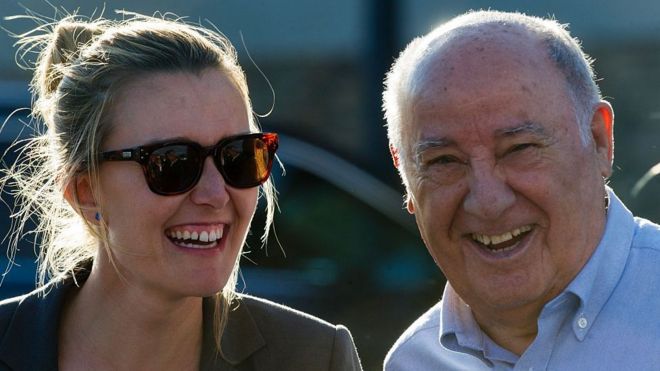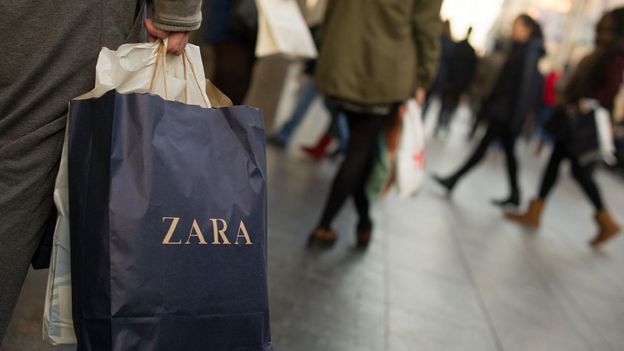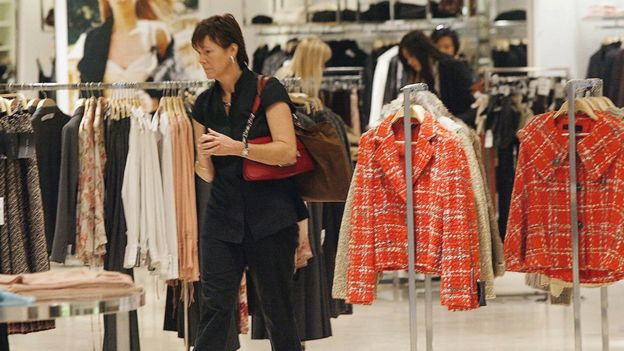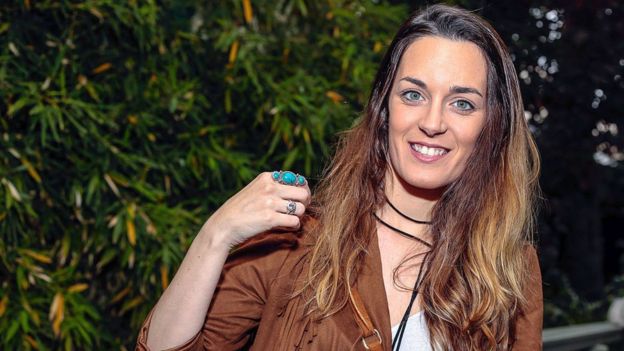- 4 hours ago
- Business
-
(비지니스) Zara 창립자 Amancio Ortega(80세) 전세계 최고갑부아름다운 인생/비지니스 2016. 9. 10. 11:05
출처: http://www.bbc.com/news/business-37317369
How Zara's founder became the richest man in the world - for two days
 GETTY IMAGES
GETTY IMAGESAmancio Ortega, now the world's richest person, according to Forbes, with his daughter Marta Browsing the rails at Zara, you might not be aware of this: but there's an 80-year-old grandfather in northern Spain who helped pick out what you're taking to the till.
Amancio Ortega stepped down as chief executive at Zara's owner, Inditex, five years ago.
But he didn't give up work. Not at all.
Even this week, when the company's rising share price made him the richest man in the world for two days, he wasn't ready to retire.
Every day he still makes the 10km journey from his town centre house to the Inditex headquarters, based just outside the coastal town of La Coruna where he first launched the Zara brand.
Sometimes he sits down with the Zara Woman design team and they kick around ideas for the coming weeks and months - the new layout for a store, a new design for the upcoming winter collection. And if Mr Ortega has a hunch, they listen. After all he has 60 years' experience in fashion retail, built up from humble beginnings.
According to Forbes magazine, experts in estimating the bank balances of the world's wealthiest, Mr Ortega's fortune overtook that of Microsoft founder Bill Gates on Wednesday and Thursday this week, before fluctuating share prices pushed it back in to second place.
This was not Mr Ortega's first time at the top of the tree. In October 2015, he was the world's wealthiest man for a few hours. It was hailed as a milestone in Spain.
 GETTY IMAGES
GETTY IMAGESThe Zara business model is to deliver new fashions in a much shorter space of time Yet compared to the world's other richest people, he has chosen to keep a low profile, avoiding interviews and media appearances whenever possible.
The son of a railway worker, he was born in 1936, just before the outbreak of Spain's civil war. The family struggled to make ends meet, which made a lasting impression on him as a boy.
one day [he and] his mother went to pick up some groceries," according to Covadonga O'Shea, author of a biography of the Zara founder.
"From below the counter, he heard someone tell his mother, senora… we can't give you any more credit."
Ms O'Shea, launching her book in 2012, said Mr Ortega still felt shame at the family's inability to pay.
"When Amancio was telling me this, he was terribly emotional. And he said to me: 'I was deeply hurt and humiliated'". He vowed never to let his family suffer poverty again, left school, and went to work in a shirt shop.
He gradually gathered further experience with other retailers and by the early 1960s was ready to set up in business with members of his family and his future wife, Rosalia Mera. They launched first a textile manufacturing company, then later, the Zara brand.
 GETTY IMAGES
GETTY IMAGESInditex has over 7,000 shops worldwide, including in Hong Kong What gave him the edge, and made Zara and its parent company Inditex such a success, was one particular insight.
Shops were taking too long to bring people the fashions they craved. By the time a product arrived, fashion-conscious shoppers wanted something different. He decided he would radically shorten that turn-around time.
"[Amancio Ortega] did something quite unique," says Michelle Wilson, retail analyst at Berenberg.
"He set up with the ambition to give the customer what they want.
"A lot of retail is [the company] deciding what they'll want, manufacturing it and pushing it on the consumer".
Instead, at Zara and sister brands the company listens to what its shop managers tell them - asking what are customers saying, what are they buying?
And because Inditex manufactures, not in Asia, but in Spain, Portugal, Turkey and Morocco, it can react quickly, ordering more of popular products or changing styles.
"It's a pull model from the consumer rather than pushing the product onto the consumer," says Michelle Wilson.
What does Inditex own?
- Zara
- Zara Home
- Pull & Bear
- Massimo Dutti
- Bershka
- Stradivarius
- Oysho
- Uterque
And it's not a model that can be easily copied by other brands, which don't have an established local supply chain, says Simon Bowler, from equity research company, Exane.
But if other High Street brands aren't taking it on, online brands might - companies like Boohoo and Asos are only a fraction of the size of Inditex, but are focusing on shortening the time it takes to react to trends on the High Street and Instagram.
For now, Inditex is "sitting pretty", says Simon Bowler. "But in 10 to 15 years' time there are likely to be more competitors operating a similar business model."
 GETTY IMAGES
GETTY IMAGESInditex targets younger consumers with different brands including Pull & Bear and Bershka A spokesperson for Mr Ortega says the scale of his success has rather taken the company's founder by surprise. He was always ambitious for his business but he never focused on personal wealth, and has often expressed his astonishment at how things have turned out, he reports.
Mr Ortega does own a yacht, but at less than 40m long it doesn't quite measure up to the size of his wealth.
Otherwise his life revolves around life with his children and grandchildren. He seldom ventures far from La Coruna - he has a second home nearby - and if he does go for a stroll around La Marina, locals know he prefers no fuss.
Covadonga O'Shea, who has known Mr Ortega for 20 years, says his shyness is rooted in humility, that he feels the company's success is only partly down to what he has done.
When she pointed out to him the positive news coverage his company had received, he played it down, she says, saying it gave him "vertigo".
"He's not one of the rich people who looks at you from the height of his success."
'아름다운 인생 > 비지니스' 카테고리의 다른 글
(비지니스) 2017년 丁酉年에 필요한 비지니스 팁들 (0) 2017.01.07 (비지니스) Samsung Electronics considers splitting firm in two (0) 2016.11.29 (비지니스) 삼성 주력상품 Note 7 배터리 폭발로 전량 리콜 (0) 2016.09.10 (비지니스) 중국 항주에서 G20 정상 모임: 알맹이 없는 말은 삼가자고 시진핑 제안 (0) 2016.09.05 (비지니스) 비지니스 여성들이 들려주는 사업상 조언 (0) 2016.08.30